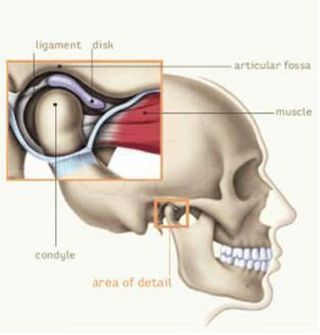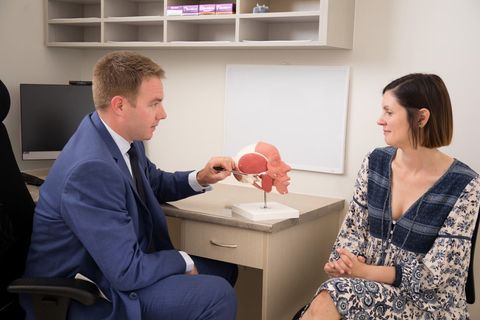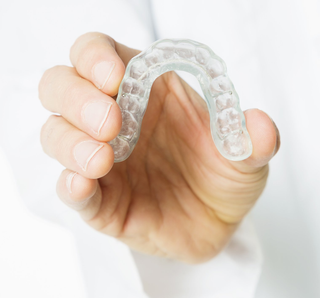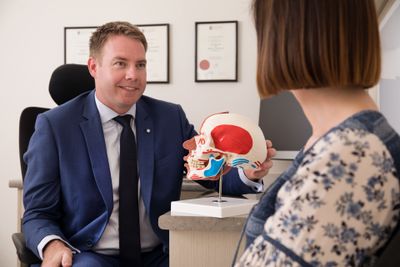TMJ Disorders
What is the temporomandibular joint (TMJ)?
The temporomandibular joint (TMJ) is the small joint located just in front of the ear where the skull is met by the lower jaw (mandible).
The TMJ is the most constantly used joint in the body and it is also the only joint in the body that both hinges and slides as part of its normal function.
It makes sense that a joint that is the most used and has such complex movements will likely suffer from disorders during its lifetime if the balance and synchronisation of these moving parts are affected.
The left and right TMJ's must work together to coordinate swallowing, opening and closing the jaws, aligning the teeth, chewing food and speaking.
What are temporomandibular disorders (TMD)?
Temporomandibular Disorders (TMD) is a collective term for a variety of clinical symptoms and signs that involve the muscles of mastication (chewing) and the internal structures of the temporomandibular joint itself.
The TMJ is in very close proximity to the brain above, the external and internal ear structures behind, and the muscles involved with chewing on either side, so the presenting symptoms of TMJ disorders can involve any or all of these structures.
Symptoms of Temporomandibular Disorders
The symptoms can include:
- Pain touching the TMJ area or jaw muscles
- Difficulty opening and closing the mouth
- Ear-aches or ringing in the ears
- Headaches
- Painful jaw when eating
- Tired sensation in jaws
- Jaw or cheekbone pain
- Popping, clicking or grating noises in the joint when opening and closing the mouth
- Change in your bite or alignment of teeth
- Pain behind the eye, ear or neck
- Difficulty moving the jaw side to side and protruding of the chin
Having one or more of these symptoms is quite common but it is still important to have your symptoms reviewed by Dr John Webster, a Specialist Oral and Maxillofacial Surgeon to receive the appropriate investigations and imaging to achieve the correct diagnosis.
Having the correct diagnosis will ensure you have access to the most appropriate treatment for your condition and rule out other serious pathologic lesions in and around the joint.
What are the most common TMJ Disorders?
60-70% of the general population will have one symptom or sign of TMD but that does not mean they all have a disorder. Of all TMD presentations to the Dentist or Specialist diagnoses are often categorised into four main groups:
- 80% are muscle-related issues
- 15% are joint or internal derangement of joint structures
- 4% are osteoarthritis
- 1% are other degenerative joint diseases or significant pathology
What are the treatments for TMJ Disorders?
The treatment for TMD is tailored to each actual diagnosis within the International Association for Study of Pain Diagnostic Criteria for TMD (RC/TMD 2014).
Generally, the treatment can range from conservative dental and medical treatments to complex joint replacement surgery.
Depending on the diagnosis, the treatment can be as simple as a short trial of any of the following conservative non-surgical treatments:
- Trial of strict non-chewing diet
- Non-steroidal anti-inflammatory medications for pain and muscle relaxation
- Muscle relaxant medications
- Occlusal splint manufactured with your Dentist
- Stress management/counselling effective in reducing muscle tension and pain
- Botox injections to the chewing muscles
- Several treatments with a TMJ physiotherapist.
If non-surgical treatment is unsuccessful or investigations show clear damage to the internal structures of the joint, then surgery may be required to repair or reposition structures in the joint.
Surgery can involve either arthroscopic surgery with very small 1.9mm camera video scopes and instruments (similar to hip and knee arthroscopy) or repair of damaged tissues by a direct open surgical approach with even custom made patient-specific total joint replacements available for the irreversibly degenerated TMJ.
Dr John Webster has completed post-fellowship training with world pioneers in minimally invasive TMJ arthroscopy and open joint surgery including Dr Joseph McCain, Dr Gary Warburton, Dr Scott Levin, Dr Jeff Moses and Dr Louis Mercuri.
Any surgery follows a 10 step conservative treatment pathway to ensure the most cost-effective and successful treatments are provided for each patient and their individual diagnosis.
How can you book in for a consultation regarding your TMJ issues?
If you would like to know how we can help you further or to book a no-obligation initial consultation please phone 07 4580 4733
or alternatively request an appointment now online.






